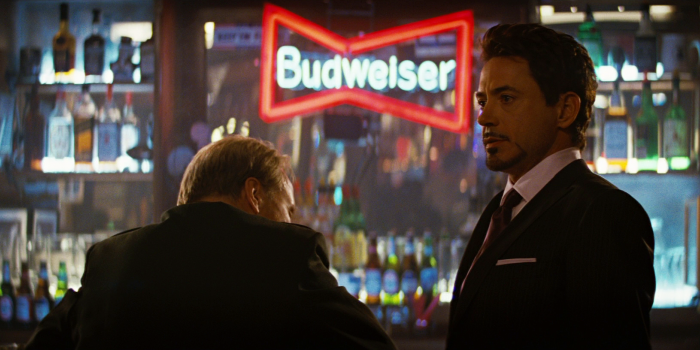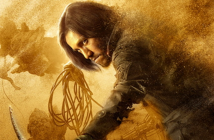
Cast: James Floyd, Fady Elsayed, Saïd Taghmaoui
Director: Sally El Hosaini
Country: UK
Genre: Drama
Official Trailer: Here
Editor’s Note: My Brother the Devil opens on Friday, June 28 in Toronto at Carlton Cinema.
Like the bond between mother and child, psychologically engrained no matter the respective personalities in any particular case, the relationship between brothers is one of a universal nature, no circumstances—be they social, economic, personal, geographical—eroding the basic constitution of that strange intersection of masculinity and fraternity. There’s a certain irony that one of the finest cinematic examples of that bond in recent years should come of a woman; Sally El Hosaini is the director of My Brother the Devil, which constructs the relationship between British Arab teens Rash and Mo with a relentless realism any brother will instantly recognise.
Wryly posited as yet another urban gang movie, the film initially foregrounds a narrative entrenched in vengeance to belie its loftier aims; El Hosaini manipulates this framework, using it as a backdrop against which to conduct a sharp dissection of masculinity, fraternity, and the familiar images thereof.
 As much credit as El Hosaini earns for the legitimacy of this screen relationship, it’s equally the work of her leads that renders it in quite such believable terms. Newcomer Fady Elsayed is Mo, the younger of the two, making the sort of bold debut that grabs attention by the throat for the film’s entirety. He is immense in a role that’s essentially little more than an idolising child, gazing at his big brother with deifying eyes and determined to be just like him. James Floyd’s is a more complex role, and one he takes to every bit as well as his younger counterpart; embodying at once the tough nature of a gangster-in-the-making and a protective brother eager to keep his family apart from the life he leads. Elsayed and Floyd between them create an eminently relatable familial tie, their bond a strong basis from which to explore this narrative.
As much credit as El Hosaini earns for the legitimacy of this screen relationship, it’s equally the work of her leads that renders it in quite such believable terms. Newcomer Fady Elsayed is Mo, the younger of the two, making the sort of bold debut that grabs attention by the throat for the film’s entirety. He is immense in a role that’s essentially little more than an idolising child, gazing at his big brother with deifying eyes and determined to be just like him. James Floyd’s is a more complex role, and one he takes to every bit as well as his younger counterpart; embodying at once the tough nature of a gangster-in-the-making and a protective brother eager to keep his family apart from the life he leads. Elsayed and Floyd between them create an eminently relatable familial tie, their bond a strong basis from which to explore this narrative.
Accusations of familiarity would not go unwarranted: El Hosaini deploys convention in excess, establishing hers as a story ill-distinguished from the countless other London-based gangland dramas we’ve seen. The key difference, and the source of My Brother the Devil’s brilliance, is the deliberateness of the clichés, innumerably stacked atop one another in a teetering tower of tired tropes which El Hosaini uses to play on our expectations, making all the more impactful and ingenious her subversive intent. Wryly posited as yet another urban gang movie, the film initially foregrounds a narrative entrenched in vengeance to belie its loftier aims; El Hosaini manipulates this framework, using it as a backdrop against which to conduct a sharp dissection of masculinity, fraternity, and the familiar images thereof. It’s a marvellous generic twist, undermining the very foundations of this well-worn story to question the deeper issues underlying its structure.
Working closely with cinematographer David Raedeker, El Hosaini paints her powerful drama in tones reminiscent of poetic realism, the fluidity of their camera’s motions and its attuned matching of each shot’s depth of focus to the psychological space of the characters making My Brother the Devil a film as accomplished visually as it is narratively.
 The innovation El Hosaini brings to these overdone narrative aspects breeds a striking symbiosis between the structure she subverts and the characters she thereby builds. In adopting cliché to her inspired deconstruction of masculinity and fraternity, she makes ferociously real figures of Rash and Mo, their nuanced personalities born of her subversive tendencies and the dialogue formed between these and predominant cultural stereotypes. In turn, the depth of her characters feeds back into the familiarity of the story, allowing an unironically conventional third act to recoup the tension and drama overexposure would otherwise cost it. There is little surprise to be found in the final moments of the film, yet such is our investment in these characters and their relationship by then that the formula is renovated and renewed, its impact retained where otherwise its effect would be entirely numbed.
The innovation El Hosaini brings to these overdone narrative aspects breeds a striking symbiosis between the structure she subverts and the characters she thereby builds. In adopting cliché to her inspired deconstruction of masculinity and fraternity, she makes ferociously real figures of Rash and Mo, their nuanced personalities born of her subversive tendencies and the dialogue formed between these and predominant cultural stereotypes. In turn, the depth of her characters feeds back into the familiarity of the story, allowing an unironically conventional third act to recoup the tension and drama overexposure would otherwise cost it. There is little surprise to be found in the final moments of the film, yet such is our investment in these characters and their relationship by then that the formula is renovated and renewed, its impact retained where otherwise its effect would be entirely numbed.
Its sharp undercutting of convention and the genuine characters it forges see El Hosaini’s script function as the loud announcement of a brilliant new voice in British filmmaking. It’s all the more cause for excitement, then, that she’s just as enriching and fulfilling a director as a writer. Working closely with cinematographer David Raedeker, El Hosaini paints her powerful drama in tones reminiscent of poetic realism, the fluidity of their camera’s motions and its attuned matching of each shot’s depth of focus to the psychological space of the characters making My Brother the Devil a film as accomplished visually as it is narratively. This is a remarkable film on every level—all the more so for the many debuts it comprises—a defiantly cineliterate and daringly subversive work of genius that finds freshness in stale tropes, that espouses its brilliance in the delicate balance between knowing when to use cliché, and when to abuse it.
[notification type=”star”]84/100 ~ GREAT. My Brother the Devil is a remarkable film on every level—all the more so for the many debuts it comprises—a defiantly cineliterate and daringly subversive work of genius that finds freshness in stale tropes, that espouses its brilliance in the delicate balance between knowing when to use cliché, and when to abuse it.[/notification]



